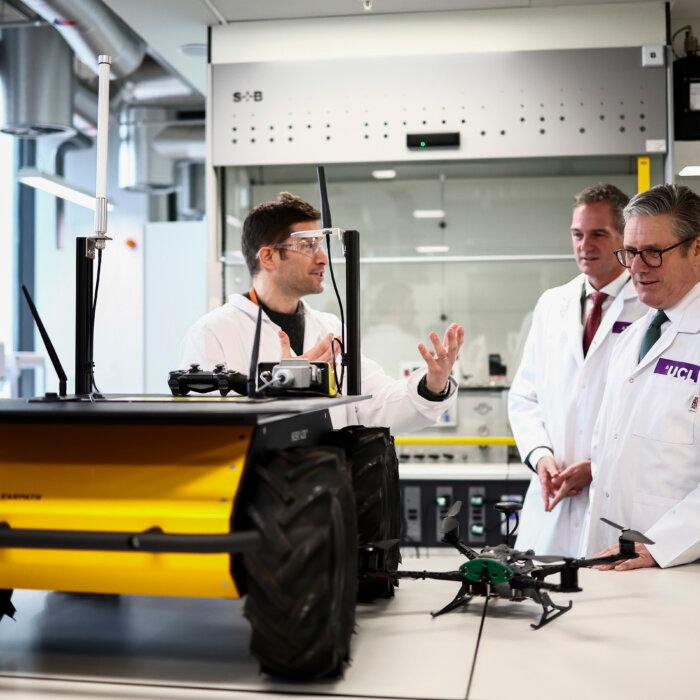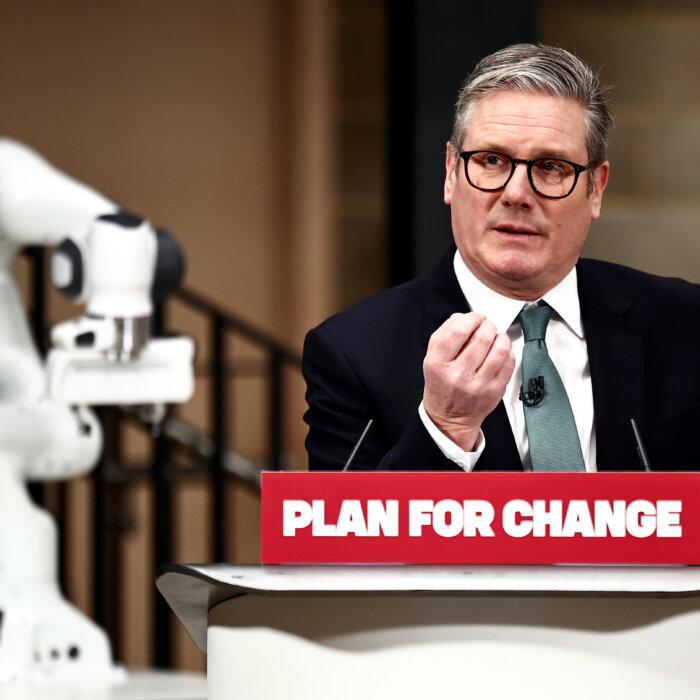Artificial intelligence (AI) will reshape the labour market rather than outright replace jobs, an AI expert has suggested, advocating for balanced regulation that fosters innovation while safeguarding workers.
Author and corporate advisor on AI, automation, and digital transformation, Kieran Gilmurray, told The Epoch Times that automation has been affecting jobs for decades, with AI as the latest development in this ongoing transformation.
“AI relies on data, logic, flow and sequence. Until we break jobs apart into structured, logical tasks, replacing entire roles will be difficult.
“The same claims were made when robotic process automation emerged, yet rather than replacing jobs outright, it simply refined and optimised tasks,” he said.
Gilmurray dismissed fears of widespread job losses, arguing that automation primarily tweaks existing processes rather than eliminating entire roles.
“It’s tweaking. It’s not replacing,” he said.
His comments come as new reports from major think tanks and financial institutions warn about the potential disruption AI could bring to the workplace.
The bank estimates that one-fourth of all current work could be replaced by AI, and globally, the number of jobs affected could reach 300 million full-time positions.
Addressing concerns over job displacement, Gilmurray acknowledged that some roles will be changed but maintained that AI’s role in the workforce will ultimately depend on how businesses and workers adapt.
He stressed that AI’s benefits will only be realised if governments, businesses and employees actively prepare for its integration.
Not a ‘Panacea’
The Labour government has pledged to “harness“ the power of AI and ”strengthen safety frameworks.” Speaking in January, Prime Minister Sir Keir Starmer said that UK’s approach to AI regulation will be “be pro-growth and pro-innovation.”“Our ambition is not just to be an AI superpower but also make sure that this benefits working people,” he said.
Gilmurray cautioned that AI will not be a “panacea” for the challenges facing the jobs market.
While it can improve productivity and streamline tasks, many workers still face barriers such as low literacy, poverty and other socio-economic factors that limit their ability to adapt to new technology, he added.
He stressed the need to ensure that people—through government programs, the education system and workplace initiatives—gain the knowledge and skills needed to navigate this transformation.
Analysts acknowledge that while AI may replace some jobs, it will also create new ones, making work more efficient and saving costs. This could lead to a major boost in productivity, according to Goldman Sachs, though it’s unclear when it will happen.
The bank estimates that AI could eventually increase annual global GDP by 7 percent.

What Jobs Are Affected?
Recent analysis by the International Monetary Fund (IMF) suggests that AI could affect income and wealth inequality globally.AI is likely to complement high-income workers by increasing their efficiency, potentially leading to higher salaries for those already in well-paid positions, the IMF said.
At the same time, lower-income workers may find it harder to compete in an increasingly AI-driven job market.
However, AI is no longer just affecting routine manual jobs. According to Gilmurray, the rise of generative AI is now disrupting skilled cognitive roles in industries such as marketing, IT and finance.
He noted that generative AI can now do research, create content and even replicate emotional intelligence to some extent.
“Not only now can generative AI create content and give us answers, but it can now take action,” he added.
While many roles are being reshaped by AI, some jobs remain difficult to automate.
Tradespeople such as plumbers and electricians are relatively safe, as their work requires manual dexterity and on-site problem-solving. Similarly, caregivers and therapists rely on emotional intelligence and human interaction, which AI still struggles to replicate.
Gilmurray noted that certain industries, such as agriculture and retail, are seeing partial automation, with AI-powered machines assisting in tasks like milking cows, monitoring crops, and helping customers choose products.
“But again, it’s at scale, because the technology costs so much money you wouldn’t do with a local farmer down your road to it, you know, 20 hectares. It’s nonsensical from an economic perspective,” he added.
In hospitality, robots are already being used for hotel check-ins, cleaning services, and customer inquiries and reducing the need for human staff.
AI Safety and Global Competition
The rapid expansion of automation and AI in the labour market has led to growing calls for closer scrutiny of how the technology is being deployed.The IPPR warned that UK’s AI policy lacks direction, arguing that the focus has been too narrow—either on accelerating AI adoption or ensuring its safety.
Carsten Jung, head of AI at IPPR, stressed the importance steering AI towards addressing societal problems.
“Politics needs to catch up with the implications of powerful AI. Beyond just ensuring AI models are safe, we need to determine what goals we want to achieve,” he said.
As the UK ramps up investment in AI, the challenge remains in striking a balance between regulation and innovation. Gilmurray says it has to be “a mixture of both.”
“You need enough legislation to protect consumers, because consumers are smaller than big tech. Put too much regulation in, big tech will move to another country at the click of a button,” he said.
He noted the example of Singapore, where officials have taken a proactive approach, investing heavily in AI education to prepare its workforce for digital transformation.
Gilmurray believes that similar policies are needed elsewhere.
“Singapore recognised that its aging population and productivity challenges required action. They invested in training people in AI, automation and digital skills to ensure everyone can take part in the economy,” he said.
Labour’s ambition is to position the UK as the world’s third-largest AI market, behind the United States and China.
However, leading AI research organisations warn that many sectoral regulators are still struggling to adapt to AI. They stress the need for new expertise to close regulatory gaps and accelerate AI readiness.
Gilmurray emphasised that AI safety requires a multi-faceted approach.
“It’s not one thing. It’s education, it’s security, it’s firewall, access, it’s good policy. It’s good, responsible AI, a whole host of things that we can do to make sure that it’s AI for good, not AI for harm,” he said.
At the two-day AI Action Summit in Paris, which concluded on Tuesday, the UK and the United States refused to sign an international agreement on AI regulation, citing concerns over innovation restrictions and national sovereignty.
While European nations pushed for stricter AI governance, both the UK and the United States emphasised the need for flexible policies that support technological advancements while addressing ethical and security risks.







